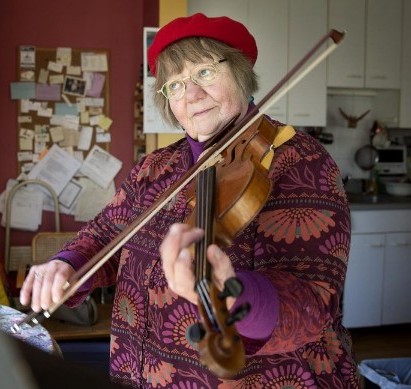Blog
-

‘I Completely Turned My Back On Music’: A Violist’s Journey With Hearing Loss.(It turns out… classical music is more damaging than rock ‘n’ roll).
 19 Apr , 2018
19 Apr , 2018
‘I Completely Turned My Back On Music’: A Violist’s Journey With Hearing Loss.(It turns out… classical music is more damaging than rock ‘n’ roll).
The list of aging rock ‘n’ roll musicians who have damaged their hearing after a long career on stage is growing.
Huey Lewis and the News canceled its 2018 tour last week after Lewis told fans that he “can’t hear music well enough to sing.”
Eric Clapton told the BBC this year that he is going deaf.
And in March, Roger Daltrey, the front man of The Who, told concertgoers that he is “very, very deaf,” and relies on hearing aids while performing.
But the issue of noise-induced hearing loss is a problem for classical musicians, too.
“I completely turned my back on music,” says violist Betty Hauck, who retired from professional music at the age of 65 because she could no longer hear well enough to perform. “I didn’t want to have anything to do with music whatsoever. If I couldn’t play up to the level I was used to, I wasn’t going to do it.”
Hauck’s long career included playing at the White House for the Kennedys. She’s played in a string quartet with Yo-Yo Ma, and performed in the Middle East.
But one day, while playing a Bach cantata at the Emmanuel Church in Boston, Hauck says she couldn’t follow along with the music.
“I quit on the spot,” she remembers. “I didn’t want to put any of my colleagues in the very awkward position of telling me that it was time to stop playing.”
Hauck can’t say for sure if it’s her career in music that led to her moderate-to-severe hearing loss. But there is a known connection. Researchers say years of exposure to an orchestra can take their toll.
According to one German study, professional musicians were nearly four times more likely to experience noise-induced hearing loss. Another found that nearly 60 percent of classical musicians have damaged hearing.
“It turns out classical music is more damaging than rock ‘n’ roll,” says Marshall Chasin, an audiologist who works with musicians in Toronto.
Because even though the intensity of a rock ‘n’ roll set might be greater, Chasin says classical musicians are more likely to practice for long hours and teach other musicians, in addition to regular performances. “If you take the dose that they get — the number of hours per week playing — for a classical musician, it’s much, much greater.”
“I started grieving. And as a result of that, I discovered the sweetness on the other side.” Betty Hauck
For Betty Hauck — and for most musicians — the hearing loss was gradual.
And she was not prepared to deal with it.
Hauck practiced with hearing aids for a while, and then used them during performances. But eventually, they weren’t enough. Hauck gave up music. She didn’t touch her beloved viola, which she had owned since 1969.
“I was depressed and I was in denial about what a huge loss it had been,” she says. “I had decided I was going to treat my hearing loss as a neutral event, kind of take a Buddhist approach and think it’s neither good nor bad. It’s just something that’s happened to me.”
But it wasn’t a neutral event.
It took three difficult years for Hauck to accept the loss of her hearing, her career and the music that had been such a big part of her life.
She began working with an auditory trainer, and meeting other people who had also suffered hearing loss.
“I started grieving,” she says. “And as a result of that, I discovered the sweetness on the other side.”
Today, at 72, Hauck is playing again. She performs small concerts at churches or at retirement homes for people who struggle to enjoy music after they experienced some kind of hearing loss.
Losing your hearing can make listening to music physically uncomfortable. Any song with more than one instrument can be impossible to make out. So when an audience sits in front of Hauck in a quiet room, as she plays a single viola, there’s a chance they can hear her.
“I may be playing out of tune. I may not be at my peak of playing. I don’t strive for that,” Hauck says. “But I love it when people tell me they haven’t been able to listen to music and enjoy it, and when they hear me play they can. That just gives me such joy.”
Source: Here And Now/WBUR
Image credit: Robin Lubbock/WBUR





























































































































































































































































































































































































































































































































































































